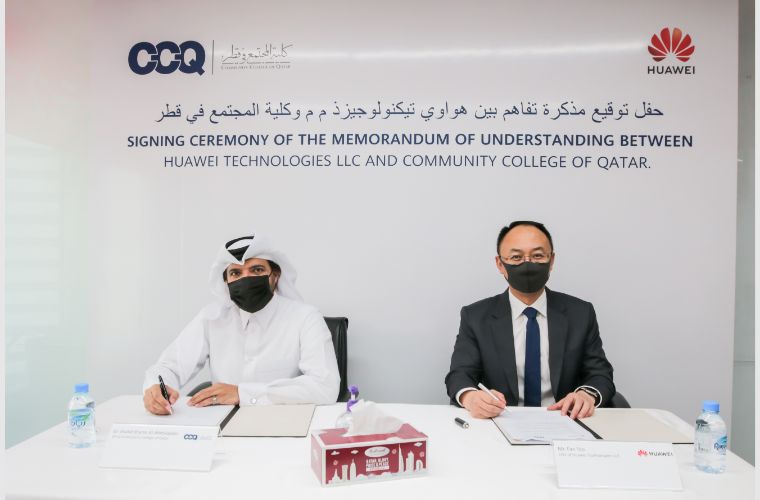Huawei, a leading global provider of information and communications technology (ICT) infrastructure and smart devices, has signed a Memorandum of Understanding (MoU) with Community College of Qatar (CCQ), to build the Huawei ICT Academy for the college’s students.
The MoU was signed by Dr. Khalid Al-Abdulqader, Vice President of Community College of Qatar, and Mr. Fan Tao Huawei Technologies LLC Chief Executive Officer, in the presence of senior officials from both parties. Under this partnership agreement, Huawei will launch its ICT Academy at CCQ to deliver training and certification programs to the students via the Huawei Authorized Information and Network Academy program (HAINA). Huawei will also provide the latest technology equipment and provide Huawei Certification Academy Instructor (HCAI) training for the teachers for each course. Through this collaboration, Huawei and CCQ aims to contribute towards the development of Qatar’s ICT talent ecosystem, in line with Qatar Smart Program, Digital Strategy 2026 and Qatar National Vision 2030.
Commenting on this partnership, Mr. Fan Tao Huawei Technologies LLC Chief Executive Officer, said: “Through the Huawei ICT Academy, we will work with our long-term partner, CCQ, to nurture the ICT talent ecosystem in Qatar that meets industry requirements, and can provide high-quality, skilled talent for the local ICT industry. The ICT industry is a crucial component of Qatar’s Vision 2030, and we are proud to partner with CCQ to contribute to Qatar’s economic development and digital economy.”
Dr. Khalid Al-Abdulqader, CCQ Vice President, commented on this occasion saying: “The MoU with Huawei aims to help the Qatari youth develop skills they need to get involved in the job market in a better way. This initiative will enable them to participate in the development process of Qatar’s growing economy, which is transforming into a knowledge-based economy with keen interest in digital economy and technological projects. This cooperation would also make the educational experience comprehensive, as it will complement the theoretical part, which our students will acquire in school. The training and certification programs that the college will offer in cooperation with the tech giant, Huawei, will be via the Huawei Authorized Information and Network Academy Program (HAINA) and they are optional. At CCQ, we always aim to participate in fulfilling Qatar National Vision 2030 by all possible means, especially with regard to human development.”
Launched in 2013, the Huawei ICT Academy helps universities cultivate ICT talent that meets industry requirements, providing high-quality workforce for the sector’s development. As a leading global ICT solutions provider, Huawei advocates for an open, shared, ICT talent ecosystem that benefits all parties. Through this initiative, Huawei builds a talent supply chain covering the entire process of learning, certification, and employment—by deepening the cooperation mechanism between universities and enterprises, aiming to promote industry development, and innovate talent development models based on enterprise requirements.
Huawei has invested heavily in exploring practices with universities and colleges and replicating successful experiences. By the end of 2019, Huawei ICT Academy had been deployed in China, Southeast Asia, the Middle East, Africa, Europe, Latin America, and the Southern Pacific, covering 72 countries. In Q1 2020, Huawei officially released the Huawei ICT Academy Program 2.0. Through which the company aims to develop 2 million ICT professionals and popularize digital skills over the next five years by collaborating with universities. In the future, Huawei will deepen cooperation with all parties in the ecosystem, increase investment, and accelerate the construction of an all-round, full-cycle sustainable talent ecosystem to fuel the digital transformation of industries.
It is noteworthy to mention that a CCQ delegation reached the 2018-2019 Huawei ICT Competition Finals. The competition is organized by Huawei to identify promising talents, nurture local ICT talent and support future ICT leaders in their countries, toward building a strong digital ecosystem that can intelligently power 21st century communities and drive the socio-economic growth.



